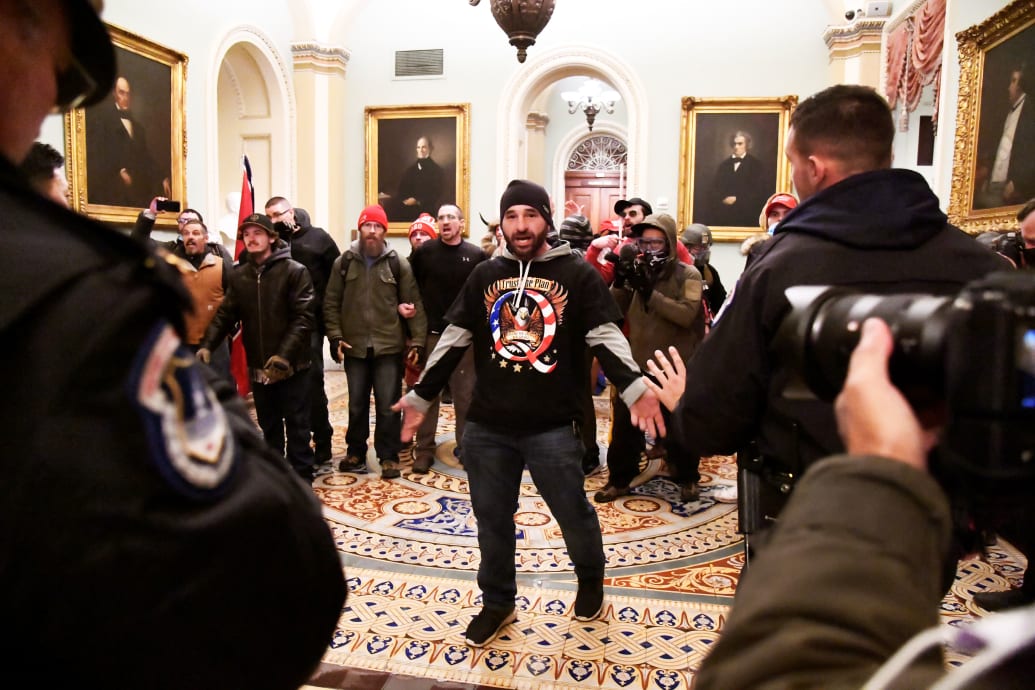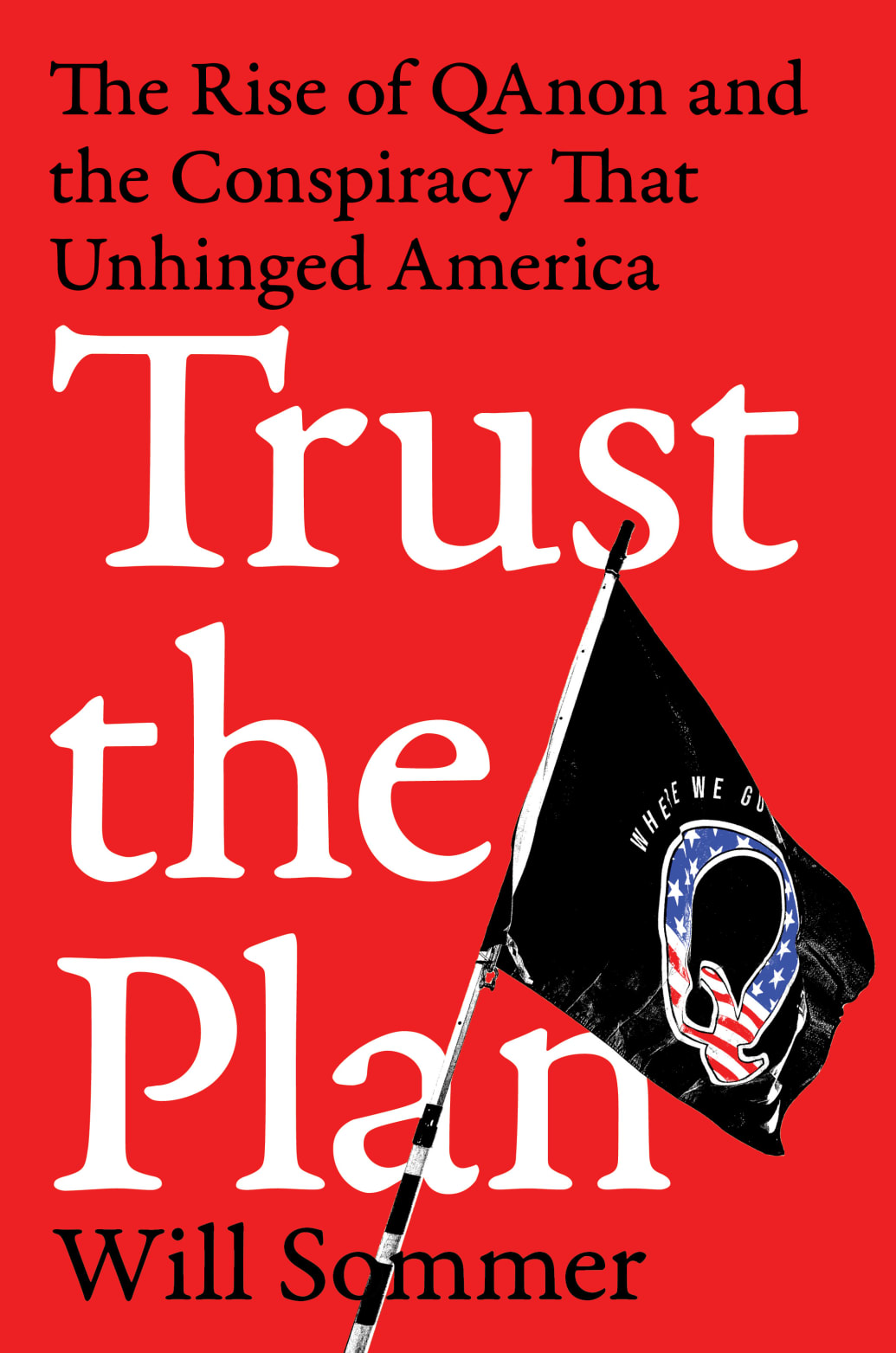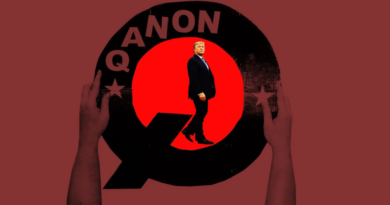What Can You Do When Someone in Your Family Goes All QAnon?
There comes a moment in every new Q follower’s life when the person closest to them realizes that they aren’t joking. The Facebook binges and the sudden adoration for Donald Trump have been waved off until now. The stray remarks about missing children and experimental vaccines have been chalked up to eccentricities. But eventually there’s no more denying it: your wife, or your son, or your father now believes in QAnon, and they want you to join them.
For the person outside QAnon, there’s a scramble to the internet that mirrors the Q believer’s own frantic online searching weeks or months earlier. Adrenochrome? Underground bases? What-Anon?
For David, a blue-collar union tradesman in his fifties, that moment came one month into the pandemic when his son Nathan walked into their family home in suburban Chicago with an announcement. In his late twenties and looking uncharacteristically grave, Nathan said he wanted to prepare his parents for some big news before they saw it on TV.
“Hey, I just want you guys to know that there are a bunch of Hollywood people that are going to be arrested,” Nathan said.
Nathan listed the names of celebrities who would soon be arrested for pedophilia: Tom Hanks, Steven Spielberg, Oprah Winfrey. David thought his son was kidding.
“Well, I hope it’s not Tom Selleck,” David said. “Because I like Tom Selleck.”
Nathan wasn’t joking. He laid out how the arrests would take place, like he was letting his parents in on a secret mission. David started taking notes. The phrases and code words all seemed to center on an idea David had never heard before: a global cabal runs the world, and Trump is about to take it down. A journey that began on Nathan’s laptop weeks earlier was finally manifesting itself into the offline world, right in David’s living room. His son believed in QAnon. Their family would never be the same.
David emailed me about his son in early 2021 after reading some of my articles about QAnon. We started talking regularly, with David giving me updates as Nathan slipped in and out of his belief in Q. Confounded by the new digital soldier living in their son’s childhood bedroom, David and his wife, Lucy, became QAnon experts themselves. David was an articulate guide to the unique despair of seeing Q take root in your family. He ran his son’s life back over and over in his head, looking for some clue about what led Nathan to this place. David was open with me about his disappointment and anger with Nathan, and sometimes even darkly amused by the twists that had allowed an anonymous internet poster named Q, someone no one in his family knew, to bring him to the brink of never speaking to his son again.
David, Lucy, and Nathan were lost deep in a novel kind of personal unraveling: family alienation through QAnon. Ever since the fateful day Nathan started talking about mass arrests in Hollywood, their family had been thrown into a wilderness with no obvious way out.
“I don’t think that people who don’t have a loved one involved with this have any idea how bad this is,” David said.
QAnon’s most eye-catching consequences can involve murders, mobs storming the U.S. Capitol, or millions of people primed to accept a fascist takeover. But its most frequent tragedy is far less visible. It’s made up of innumerable stories of human connections destroyed, a story that plays out every day across the country in kitchens, office break rooms, and tense car rides.
From the outside, Nathan appeared to be living much the same life he had before he discovered QAnon. But for those closest to him, the Nathan who existed before Q was gone. In his place was an angry, frustrated young man with a monomaniacal interest in fantasizing about the Storm. QAnon made Nathan’s life smaller and sadder, and strained his relationships with everyone around him.
The arrests Nathan predicted that day never came, but that family meeting was just the start of his attempts to red-pill, or convert, his parents. He argued with them constantly and used any opportunity to steer them back to the conspiracy theory. In a way, David had to admit he was impressed by QAnon’s ability to explain the entire world. Leaked texts showed actor Armie Hammer fantasizing about cannibal sex acts? More proof that Q was right about the Hollywood sickos. Elon Musk launches a rocket into space? A chance for Nathan to mention that the moon landing was faked.
Nathan’s few remaining friends started to drift away. David had a vivid image of what Nathan’s future looked like if he didn’t give up on QAnon: living in a cardboard box under a bridge, abandoned by everyone who once loved him.
I’ve talked to dozens of people like David, whose relationships with someone close to them were destroyed when that person got into QAnon and became obsessed with recruiting everyone around him. There was the mother who had to find a way to explain to her ten-year-old son that he couldn’t see his uncle anymore, because he had become obsessed with QAnon. A woman whose husband picked up a cocaine habit so he could stay up decoding late-night Q drops, and carried on affairs with fellow believers he met online to get an understanding he couldn’t find in his marriage to a Q skeptic. I heard from more than one person who was surprised to find that their spouse, now a QAnon believer, suddenly didn’t want to vaccinate their children.
The personal destruction wrought by QAnon has put people outside of it in positions they never imagined. There are parents afraid to speak to their children, and children who realize the person they trusted most in the world has lost their connection with reality. QAnon can seem like a distant problem, something confined to Trump rallies and the darkest corners of the internet—until it transforms someone you know, falling on them like an exotic, incurable virus. For David, his son’s QAnon indoctrination pointed at something missing in Nathan’s life, but he didn’t know what it could have been.
“The plague of people losing family members to QAnon has inspired a small industry that promises to deradicalize QAnon members. ”
David’s own reaction to Trump had been much different. He had been an apolitical, white, blue-collar worker in the Midwest, exactly the kind of voter to whom Trump was supposed to hold a special appeal. But the election of a man he called a “two-bit con man” had pushed David in the other direction. He became a dedicated MSNBC viewer. He tracked the myriad legal cases against Trump associates, hoping that one would finally flip on Trump and break whatever spell had been cast on Q believers like Nathan.

USA-ELECTION/
Douglas Austen Jensen of Iowa, a supporter of President Donald Trump wearing a QAnon shirt, confronts police as Trump supporters demonstrate on the second floor of the U.S. Capitol near the entrance to the Senate after breaching security defenses, in Washington, U.S., January 6, 2021.
Mike Theiler/Reuters
On January 6, 2021, David watched on MSNBC as rioters breached the U.S. Capitol. A friend doing the same called him with a question: Was Nathan rioting in Washington, too? David was grateful that his son was at home, but he admitted that it seemed like exactly the kind of thing Nathan would do.
“Thank God we don’t have any guns,” he told me.
And then the pandemic hit
Nathan had always been drawn to strange ideas. As a teenager, he was fascinated by Bigfoot and aliens. But Nathan’s interest in conspiracy theories didn’t take off in earnest until the pandemic began, when Nathan moved back in with his parents and his social circle shrank down to the walls of his home. Without roommates around, he had been spending a lot of time on his laptop. Nathan gave up any pretense of living in the real world after coming out as a QAnon supporter. He spent his days locked up in his room at his parents’ house, smoking marijuana and reading the Q boards. He emerged only to get food and pressure his parents to watch QAnon videos. Their arguments became repetitive, always starting with Nathan making some bold claim, like that John F. Kennedy would return to life to run as Trump’s vice president.
For David, Nathan’s transformation from his somewhat off-kilter son into the Q-entranced stranger living in his house raised questions about what kind of father he had been. He admitted that he hadn’t been the perfect dad, but until Nathan got into QAnon he had thought they had a normal father-son relationship—maybe a little stiff, but nothing that should prompt this.
David clung to the few apolitical topics he shared with Nathan, including a family fantasy baseball league. But Nathan soon lost interest in baseball, saying it wasn’t “real” enough to him when compared to QAnon.
“I can’t understand it,” David told me. “For a rational person to fall for this stuff, how do you sympathize with them? How do you put yourself in those shoes?”
After nearly a year of increasing tensions with Nathan about QAnon, David’s wife suggested they go to a therapist. But when David and Nathan sat down for the counseling session, they realized the therapist had never heard of QAnon. David spent the first session trying to explain Q to the therapist, fearing he was coming off just as unhinged as his son. The counselor eventually decided that Nathan’s QAnon delusions would lift if he would stop smoking so much marijuana.
For David and his family, as for so many others caught up in the conspiracy theory, QAnon had become a story about institutions failing. Mental health specialists were caught nearly entirely off guard by its spread, and unable to offer any useful advice for reaching family members caught in Q’s grip. But they weren’t alone.
The American government had missed QAnon’s spread. Even if the government had wanted to step in, it wasn’t clear that there was anything legal to do about it. The social media companies profited from the engagement QAnon stirred up, right up until it threatened to no longer become profitable. Now that entire mess, a package of failures from anyone who should have stopped QAnon before it ensnared so many people, landed on David and Nathan.
David tried to find resources online for pulling someone out of QAnon but found little he could use. The plague of people losing family members to QAnon has inspired a small industry that promises to deradicalize QAnon members. There are books and news articles offering tips for “blue-pilling” loved ones out of QAnon and other conspiracy theories, nearly all of them premised on maintaining a civil relationship with the QAnon believer and avoiding confrontation or trying to debunk their beliefs. In time, the theory goes, the QAnon supporter will come out of the conspiracy theory on their own and reach out for help in leaving QAnon.
That passive strategy for dealing with QAnon radicalization may be the best approach. It’s also nearly impossible. It asks the family members of QAnon believers to shoulder an enormous burden, acting as a psychologist, epidemiologist, historian, debater, and social worker—all while having the mammoth amounts of patience required to put up with feverish ravings and verbal abuse.
“When you’re confronted by him virtually every night with this stream of nonsense, you can’t keep quiet,” David said of his son.
At best, David thought his son might someday break out of QAnon on his own or lose interest and move on to some other strange obsession. But David didn’t see that happening anytime soon. QAnon had become the one constant in his son’s otherwise aimless life. In a strange way, Nathan finally had a purpose.
“He’s never been this committed to anything,” David said.
Just as new people drawn to QAnon are welcomed into its online communities, the personal damage left in QAnon’s wake has created parallel online communities for people suffering from its spread. Ex-QAnon “apostates” and grieving family members swap stories and advice on forums like Reddit’s “QAnon Casualties” board. The rare success stories are vastly outnumbered, though, by posts about the frustrations of trying to persuade someone to leave QAnon behind.
Every time I wrote an article about QAnon, people would email me asking for a solution to a loved one lost to QAnon. I didn’t have any answers, so I asked experts who had ideas of their own, hoping to come up with some way to help these distraught families. What I found out from talking to people involved in reducing QAnon’s harm is hard, but unavoidable: there’s no guaranteed way to dissuade a QAnon believer.
“The reality is that we don’t really know what really works or if anything does work to get someone out of QAnon,” Dr. Joseph M. Pierre, a University of California, Los Angeles, psychiatrist who has studied QAnon, told me.
For one thing, QAnon apostates almost never leave the movement because of treatment from a therapist or psychiatrist, according to Pierre. Instead, people who walk away from QAnon often describe experiencing a personal “disillusionment” with the cause that had nothing to do with the efforts of loved ones or mental health professionals. It can be as simple as personal fights with other believers, losing faith in a once-beloved QAnon leader, or stumbling upon a debunking video that somehow pierces their reality-denying defenses.
““I keep going back to Linus in the pumpkin patch,” David said. “That’s my son. Except he’s angry about it.””
One thing experts who have studied QAnon exit methods almost all agree on is that the most obvious and temporarily satisfying option—a full-frontal debunking assault—is also the worst. Reacting to a QAnon believer’s claims with anger, ridicule, and insults about tin-foil hats will only cause them to shut down or sever the relationship. Many QAnon believers are drawn to the conspiracy theory because they feel marginalized or disrespected, according to Dannagal Young, a professor of communication and political science at the University of Delaware who researches what drives people to believe in misinformation. Mocking QAnon to them only demonstrates further that they’re not valued in their real-life community. Because their beliefs in QAnon aren’t driven at their heart by a desire to truly understand the world, trying to dissuade a believer with facts might not work.
“All that’s going to do is confirm their worldview that they’re an outsider and people aren’t to be trusted,” Young said.

A supporter of President Donald Trump holds an U.S. flag with a reference to QAnon during a Trump 2020 Labor Day cruise rally in Oregon city, Oregon, U.S. September 7, 2020.
Reuters
Instead, the people left grieving in QAnon’s wake are generally encouraged to keep the relationship going and avoid mentioning Q. While the believer may need to come to their own revelation that the movement is fake on their own, having personal connections that survived their QAnon experience will make that easier. That advice may be good in theory, but it is often maddening to implement, given how persistent and aggressive QAnon believers can be. Young says that trying to bring someone out of QAnon is “so, so hard” and urges people considering it to first conduct a cost-benefit analysis on whether they want to maintain their relationship with the Q follower.
A high school friend on Facebook or a crazy uncle you only see once a year at Christmas might not be worth the aggravation. But working for the remote possibility of restoring a spouse or parent to the real world might make waging what Young calls “a long game” more reasonable. Rather than directly confronting a QAnon believer, Young and other deradicalization researchers suggest a less direct approach that relies on just getting them away, mentally and physically, from QAnon. Take them for a walk or a dinner, or anything else that gets them offline. Young suggests reminding them of positive memories from the past to help them see themselves as existing beyond QAnon.
“David was learning how to live with QAnon in the family, walking around it delicately in every conversation.”
“You’re working to dilute what has become a superconcentrated identity based on QAnon,” Young said. “The way you are gently diluting it is by adding other memories, constructs, experiences, and emotions to their minds in ways that will sort of diversify how they think of themselves.”
Maryland psychiatrist Sean Heffernan started researching QAnon after he noticed Q bumper stickers while driving around an affluent suburb of Annapolis, Maryland, the home of the U.S. Naval Academy. The media image of QAnon often presented believers as uneducated bumpkins, or Trump die-hards. But he was noticing Q and “WWG1WGA” bumper stickers on cars in wealthy areas, soccer moms passing him on the highway.
Finding QAnon’s proliferation in his community “bizarre,” Heffernan researched how to bring people out of QAnon. He came to believe that many people were drawn into QAnon because of a lack of social connections in their real world, leaving them hunting for community online instead. To come out of it, they would need to see that social connection they were looking for outside of QAnon.
Like other experts, Heffernan agrees that the best option is being emotionally available for a QAnon supporter when they reach that epiphany on their own.
“I don’t think that it’s something that you can pull somebody out of,” Heffernan told me. “I think they have to be ready to leave it.”
Straining family ties
David knew all too well how hard it could be to maintain a relationship with a QAnon believer. He called me again in July 2021. Now Nathan had latched on to a new QAnon rumor that claimed the Chinese army was storming across the Canadian border into Maine. There were videos of strange lights in the darkness. There would be a climactic battle, then the Trump restoration. The Storm finally seemed to be at hand.
It had now been more than a year since Nathan first told his parents about his interest in QAnon, and David had seen plenty more predictions fail to come true before this one. When Biden won the election, David was ecstatic, feeling sure that Nathan’s interest in QAnon would deflate once Trump left the White House. In the six months after the inauguration, though, his son’s interest in QAnon had risen and fallen with the news cycle, but had never gone away entirely. Now it was back at a high point, with Nathan convinced that Trump would retake the presidency any day now.
For David, the initial shock of Nathan’s QAnon beliefs and his frantic attempts to fix them had been replaced with resignation. Nathan reminded him of Linus in the comic strip Peanuts, a child waiting alone every year for an appearance from the mythical Great Pumpkin, who never arrives.
“I keep going back to Linus in the pumpkin patch,” David said. “That’s my son. Except he’s angry about it.”
Later that summer, David called me again. Nathan still believed in QAnon. They had just finished arguing about how Nathan was convinced that the Biden people saw in the White House was a body double, and the real Biden was either dead or imprisoned. Nathan warned his parents to stock up on water bottles and a generator ahead of a societal shutdown—something Nathan dismissively said David no doubt missed on “your news.”
“It didn’t die with Trump like I thought it would,” David told me. “The critical thinking that doesn’t take place is astonishing.”
By August, Nathan’s QAnon enthusiasm seemed to have settled down a little. Now he was getting into the all-beef diet, a diet favored by conservative college professor and author Jordan Peterson, who had become a sort of father figure for lost young men.
David was learning how to live with QAnon in the family, walking around it delicately in every conversation. He had developed a set of internal rules for avoiding an eruption from his son.
“You just talk about general, life things,” he explained. “You don’t go into the controversial stuff.”
By November 2021, as David and his family wrapped up their second year of living with QAnon, he messaged me again with a hopeful message. Nathan had a girlfriend, which gave him less time to spend online. David was hopeful that Nathan might finally be returning to the real world.
He sent me an update a week later: never mind. Nathan had started talking about QAnon again, this time convinced by something he read online that the earth is flat.

From the book TRUST THE PLAN Copyright (2023) by Will Sommer. Published on February 21, 2023 by Harper, an imprint of HarperCollins Publishers. Reprinted by permission.
This article has been archived for your research. The original version from The Daily Beast can be found here.


